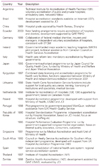1. WJ Park. Guideline of quality improvement in healthcare services. 2009. 2nd ed. Seoul: Korea Medical Book Publisher Co.;414.
2. Global Hospital Facilitation Center. Quality improvement in healthcare service in the era of global healthcare. 2010. Seoul: Korea Medical Book Publisher Co.;422.
3. Korean Hospital Association. Korean Hospital Association 50 years. 2010. Seoul: Kummyung Co.;369.
4. Korea Ministry of Health, Welfare and Family Affairs. Seoul National University College of Medicine. A study on the long-term development of accreditation system of the healthcare organizations. 2005. Seoul: Korea Ministry of Health, Welfare and Family Affairs.
5. Korea Ministry of Health, Welfare and Family Affairs. Yonsei University Medical College. A study on the introduction of hospital accreditation system. 2008. Seoul: Korea Ministry of Health, Welfare and Family Affairs.
6. Korea Ministry of Health, Welfare and Family Affairs. Korea Health Industry Development Institute. Policy forum on 'A search for method of introduction of hospital accreditation'. 2009. Seoul: Korea Ministry of Health, Welfare and Family Affairs.
7. Park JH. Understanding of the new Korea healthcare accreditation system. J Korean Med Assoc. 2011. 54:142–145.

9. Baudendistel TE, Schmaltz SP, Williams SC, Chassin MR, Loeb JM, Wachter RM. Hospital performance trends on national quality measures and the association with joint commission accreditation. J Hosp Med. 2011. 6:453.

10. Pomey MP, Lemieux-Charles L, Champagne F, Angus D, Shabah A, Contandriopoulos AP. Does accreditation stimulate change? A study of the impact of the accreditation process on Canadian healthcare organizations. Implement Sci. 2010. 5:31.

11. Groene O, Lombarts MJ, Klazinga N, Alonso J, Thompson A, Sunol R. Is patient-centredness in European hospitals related to existing quality improvement strategies? Analysis of a cross-sectional survey (MARQuIS study). Qual Saf Health Care. 2009. 18:Suppl 1. i44–i50.










 PDF
PDF ePub
ePub Citation
Citation Print
Print



 XML Download
XML Download